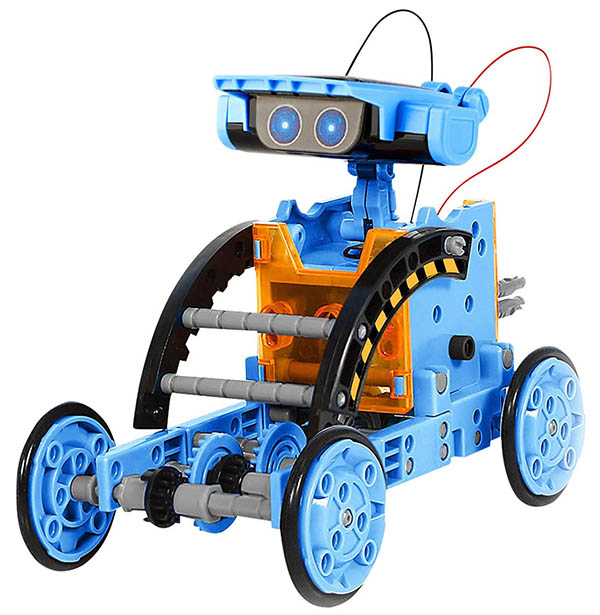2023 AI, Machine Learning, and Robotics Virtual Camp

Welcome to the 2023 Career Girls AI, Machine Learning, and Robotics Virtual Camp, presented in partnership with the Toyota Research Institute. This camp focused on safety in robotic systems, what robots can learn from humans, how teams collaborate to make great things together, and physical interactions to train robots. For four days, campers participated in incredible presentations from women working on the cutting edge of robotics and got a sneak peek of the exciting work that the women will present to the world soon. In the daily breakout groups, campers spoke with the women of TRI and learned about their path to success in AI, Machine Learning, and Robotics.
Thank you to the Toyota Research Institute for their support and for providing the campers with their robot for camp! For more information about the incredible work the women do at the Toyota Research Institute, please visit www.tri.global.
Watch this short video to enjoy camp highlights.
Masha Itkina, Ph.D.
Research Scientist,
Machine Learning Division
Toyota Research Institute
Masha Itkina is a Research Scientist in the Machine Learning Division at the Toyota Research Institute (TRI). She completed her PhD at the Stanford Intelligent Systems Lab (SISL). Her research focuses on uncertainty-aware spatiotemporal reasoning for robotic systems in human environments. Masha’s work has been published in top-tier conferences including NeurIPS, ICRA, IROS, and CoRL. Masha has brought together researchers from the machine learning and robotics communities by co-organizing three Robot Learning Workshops at NeurIPS 2020, 2021, 2022. She has been an avid supporter of women in STEM through leadership, mentoring, and teaching roles in organizations such as Women in Aeronautics and Astronautics (WIAA) and AI4ALL.
Everlyne (Eve) Kimani, Ph.D.
Research Scientist,
Harmonious Communities Team,
Human – Centered AI Division
Toyota Research Institute
Dr. Everlyne (Eve) Kimani is a research scientist on the Harmonious Communities team within the Human-Centered AI (HCAI) division at Toyota Research Institute (TRI). Her research background is in human-computer interaction and affective computing. She researches how to design automated tools to infer human emotions and mental states and support human decision-making in driving and other contexts.
Before joining TRI, Dr. Kimani completed her Ph.D. in computer science at Northeastern University, where she researched how to design automated systems for alleviating anxiety and promoting behavior change.
Leticia Priebe Rocha
UX Researcher,
Robotics User Experience & Interaction Design Team
Toyota Research Institute
Leticia Priebe Rocha (she/her) is originally from São Paulo, Brazil and immigrated to Miami, Florida at the age of nine before settling in the Greater-Boston area. She earned her B.S. in Clinical Psychology from Tufts University, where she forged an interdisciplinary research background. Leticia is currently a UX Researcher on the Robotics User Experience & Interaction Design (RUX-ID) team at the Toyota Research Institute (TRI). As a member of the RUX-ID team, she is proud to contribute to user-centered research that molds robust human-robot interaction toward a collaborative future where robots empower people to live full, balanced lives. Leticia is also a published poet and enjoys collaging in her free time.
Candice Hogan, Ph.D.
Director,
Carbon Neutrality Department,
Human – Center AI Division
Toyota Research Institute
Candice Hogan is a behavioral scientist by training, passionate about bringing behavioral science theory to life through integration in novel technology. She is currently Director of the Carbon Neutrality Department within the Human-Centered AI Division at Toyota Research Institute (TRI). The mission of the Carbon Neutrality department is to enable customers to contribute to carbon neutrality through Toyota products.
Before TRI, Candice led teams in experimentation and inference data science at Stitch Fix and applied behavioral data science at Uber. She holds a Bachelor’s degree in psychology and exercise science from the University of North Carolina at Chapel Hill and Master’s and Ph.D. degrees in psychology from Stanford University, where she was also a National Science Foundation Graduate Research Fellow.
Shabnam Hakami, Ph.D.
Senior Research Scientist,
Human – Centered AI Division
Toyota Research Institute
Shabnam Hakimi is a Senior Research Scientist in the Human-Centered AI division of the Toyota Research Institute (TRI). Her work is at the intersection of motivation, decision making, and AI, and focuses on how a person’s context affects their choices and experiences. She uses her background in neuroscience, psychology, economics, computer science, and user experience design to develop and test new interventions that can help people meet their goals and live happy, fulfilling lives. Prior to joining TRI, Shabnam trained at a variety of institutions including Duke University, the University of Colorado Boulder, and the National Institute of Mental Health. She also served as Director of Behavioral Labs at Welltok (now Virgin Health).
Shabnam holds a Ph.D. in Computation and Neural Systems from Caltech and a B.A. in Psychology from Stanford University.
Aimee Goncalves
Mechanical Engineer,
Soft Tactile Robotics
Toyota Research Institute
Aimee Goncalves is a mechanical engineer working on soft tactile robotics at Toyota Research Institute. She currently explores the intersection of squishy soft materials and sensing (in other words, making hard robots soft and able to feel touch!) for force-sensitive and force-aware whole-body manipulation and physical human-robot interaction.
Aimee received her M.S. from the University of California, Berkeley and B.S from the University of Massachusetts, Amherst, both in mechanical engineering. Throughout her career, she has worked in a wide variety of industries, ranging from surgical systems to nuclear submarines to rocket ships. Outside of designing robots, Aimee is an enthusiastic rock climber, painter, and plant parent.
Amalie Trewartha, Ph.D.
Senior Research Scientist
Toyota Research Institute
Amalie Trewartha (she/they) was born in Adelaide, Australia. She attended the University of Adelaide, where she received her undergraduate degree majoring in theoretical physics and mathematical sciences, and her doctorate in theoretical physics. During her PhD, she worked on using computational simulations to understand the behavior of subatomic particles. She continued this work as a postdoc at Thomas Jefferson National Accelerator Facility, before switching to a materials science position at Berkeley Lab, using natural language processing techniques to extract information from scientific papers. She’s currently a senior research scientist at Toyota Research Institute, and she studies applications of AI for developing next generation electric vehicle batteries. In her free time, she loves hiking, camping, and yoga!
Katherine (Kate) Tsui, Ph.D.
Manager, Human Robot Interaction Research Team,
Robotics Division
Toyota Research Institute
Dr. Katherine (Kate) Tsui is manager of the Human Robot Interaction Research team within the Robotics division at Toyota Research Institute (TRI). Dr. Tsui has 15 years of experience in Human-Robot Interaction (HRI) research and leads the HRI team and university collaborations. Our HRI research focuses on people’s trust towards home robot helpers and using robotic technology to help older adults with social isolation and loneliness.
Dr. Tsui holds a Ph.D. in computer science from the University of Massachusetts Lowell (2014) and was a postdoctoral associate at Yale University (2014-2016). Dr. Tsui has developed robotic systems and user interfaces and interactions for people with cognitive and motor impairments as the target end-user, including a vision-based wheelchair-mounted robotic arm, social telepresence robots named Hugo and Margo, and a socially assistive robot named Maki. Over the last decade, she has worked with clinicians and end users from several special populations, including children with Autism Spectrum Disorder, teenagers and young adults with Cerebral Palsy, adults and seniors with Brain Injury, and deaf infants. Her human-robot interaction and human-computer interaction research interests stem from the cross section of computer science, robotics, and assistive technology. Dr. Tsui is passionate about increasing the quality of life for all people using robotic devices.
Elissa Rupley
Senior Technical Program Manager,
Human – Centered Division
Toyota Research Institute
Elissa Rupley is a Senior Technical Program Manager in the Human-Centered division. She works alongside researchers to ensure overall coordination and delivery of projects.
Prior to joining TRI, Elissa was a Technical Program Manager supporting research and development efforts for the Defense Advanced Research Projects Agency (DARPA). She supported research programs in AI, ML, robotics, and autonomous systems. She was the Program Lead and Chief of Staff for the DARPA Subterranean Challenge working with research teams from around the world. She holds a Master’s in Business Administration from Missouri State University, a Master’s in Public Relations and Corporate Communication from Georgetown University, a Master’s in Student Affairs and Higher Education from Indiana State University, and a B.S. in Marketing from Bowling Green State University.
Evelyn Dixon
Technical Manager
Toyota Research Institute
Evelyn Dixon is a technical manager with extensive experience delivering software products from cradle to grave for on-premises and cloud services. As a troubleshooter and forward thinker, anticipates bottlenecks, manages competing priorities, provides escalation management, and evaluates tradeoffs to balance business needs under technical constraints. Leverages a well-rounded technical background to take large, complex projects and break them down into manageable pieces, develop functional specifications and schedules, and then deliver them on time.
Evelyn’s educational background is in computer science. She started out as a programmer advancing through different roles. Serving as Quality Assurance Manager, Senior Product Manager, and Director of Software Engineering at small and large companies; Sybase, Neustar, and Samsung. She now serves as Technical Program Manager in the Human Interactive Division (HID) at Toyota Research Institute (TRI). As a liaison between researchers, software engineers, and leadership she leads and coordinates efforts across project & organizational goals and their outcomes. This includes the management of resources, priorities, and engagement of individuals and teams.
Nayeli Bravo
Research Associate,
Machine Assisted Cognition Team
Toyota Research Institute
Nayeli Bravo is a Research Associate on the Machine Assisted Cognition team at TRI. Nayeli assists in the design, development and execution of human-centered research studies.
Before joining TRI, she was a Social Science Research Coordinator at Stanford University where she conducted research in early language development among young children. Nayeli earned a B.A. in Psychology from UC Santa Cruz where she also assisted in various research projects.
Ruya Karagulle
Summer Research Intern
Toyota Research Institute
Ruya Karagulle, summer research intern at Toyota Research Institute and a Ph.D. student at Electrical and Computer Engineering at University of Michigan. I did my undergraduate in mechanical engineering, at Bogazici University, Turkey. My research focuses on safe and personalizable autonomous vehicles, and includes machine learning and temporal logics as theory. As my research requires, I am also interested in studies with human subjects and exploring human preferences on driving. In my free time, I like reading fiction books, cooking and trying new cuisines and new places.
Jenna Lee
Software Engineer,
Extreme Performance Intelligent Control
Toyota Research Institute
Jenna is a Software Engineer in Extreme Performance Intelligent Control at Toyota Research Institute. Her work focuses on writing maintainable and scalable code for TRI’s research platforms (race cars!) to enable robots to collaborate on driving and to teach people how to drift. Prior to race cars, Jenna worked on driver assistance systems for semi trucks.
Bisi Chikwendu
UX Researcher,
Robotics User Experience and Interaction Design Team
Toyota Research Institute
Bisi Chikwendu (she/her) is a first-generation Nigerian-American from Massachusetts. She holds a B.S. in Health Sciences and a master’s degree in public health, both from Northeastern University in Boston. While there, she supported AI and robotics projects focused on health improvement, education, and behavior change.
She currently works as a User Experience (UX) Researcher on the Robotics User Experience and Interaction Design (RUX-ID) team at Toyota Research Institute (TRI). With RUX-ID, Bisi explores user needs and desires surrounding robotic interactions. Her projects use motion capture technology to analyze human-human interactions so that humans and robots can learn how to work together safely and effectively. Through the lens of robotics and health sciences, she seeks to improve the quality of life and health outcomes for the most vulnerable people in our society. Outside of work, Bisi likes to keep music an active part of her life by playing the violin and singing.













